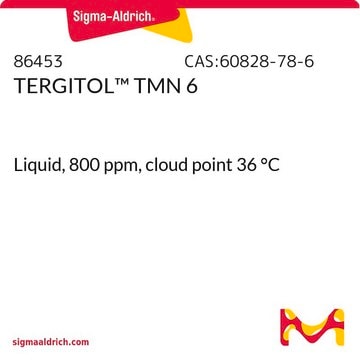15S9
TERGITOL™
Type 15-S-9
Synonym(s):
Secondary alcohol ethoxylate
About This Item
Recommended Products
description
non-ionic
Quality Level
type
Type 15-S-9
form
liquid
mol wt
596 g/mol
greener alternative product characteristics
Design for Degradation
Learn more about the Principles of Green Chemistry.
sustainability
Greener Alternative Product
CMC
52 ppm
transition temp
cloud point 60 °C
pour point 9 °C
HLB
13.3
greener alternative category
Looking for similar products? Visit Product Comparison Guide
General description
Tergitol™ 15-S-9 is a linear non-ionic surfactant that is a secondary ethoxylated alcohol. This clear liquid surfactant is compatible with anionic, cationic, and other nonionic surfactants.
Application
- To synthesize thermally stable mesoporous alumina
- To synthesize porous TiO2
- Along with SDS, ethanol and water for continuous phase preparations in electrospray emulsification
- In the synthesis of Lath-like γ-alumina and boehmite nanofibers
Features and Benefits
- Superior detergency
- Rapid dissolution & good rinseability
- Excellent formulation & handling properties
- Narrow gel range
- Readily biodegradable (OECD 301E)
- Low odor
Legal Information
Signal Word
Danger
Hazard Statements
Precautionary Statements
Hazard Classifications
Eye Dam. 1 - Skin Irrit. 2
Storage Class Code
10 - Combustible liquids
WGK
WGK 3
Flash Point(F)
469.4 °F - open cup
Flash Point(C)
243 °C - open cup
Personal Protective Equipment
Regulatory Listings
Regulatory Listings are mainly provided for chemical products. Only limited information can be provided here for non-chemical products. No entry means none of the components are listed. It is the user’s obligation to ensure the safe and legal use of the product.
PRTR
Class I Designated Chemical Substances
FSL
Group 4: Flammable liquids
Type 4 petroleums
Hazardous rank III
ISHL Indicated Name
Substances Subject to be Indicated Names
ISHL Notified Names
Substances Subject to be Notified Names
JAN Code
15S9-5ML-KC:
15S9-VAR:
15S9-BULK:
15S9-500ML:
15S9-100ML:
15S9-1L:
15S9-4L:
Certificates of Analysis (COA)
Search for Certificates of Analysis (COA) by entering the products Lot/Batch Number. Lot and Batch Numbers can be found on a product’s label following the words ‘Lot’ or ‘Batch’.
Already Own This Product?
Find documentation for the products that you have recently purchased in the Document Library.
Customers Also Viewed
Related Content
Green chemicals evaluation aligns with the 12 Principles of Green Chemistry, emphasizing resource efficiency and hazard reduction.
Cell lysis and protein extraction methods overview various techniques, from detergent solubilization to mechanical disruption, supporting research needs.
Our team of scientists has experience in all areas of research including Life Science, Material Science, Chemical Synthesis, Chromatography, Analytical and many others.
Contact Technical Service








